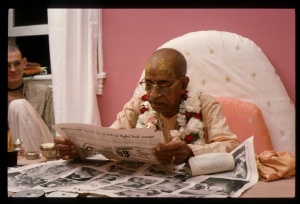CC Madhya 9.131: Difference between revisions
m (1 revision(s)) |
(Vanibot #0054 edit - transform synonyms into clickable links, which search similar occurrences) |
||
| (One intermediate revision by one other user not shown) | |||
| Line 1: | Line 1: | ||
{{ | [[Category:Sri Caitanya-caritamrta - Madhya-lila Chapter 09|C131]] | ||
<div style="float:left">'''[[Sri Caitanya-caritamrta|Śrī Caitanya-caritāmṛta]] - [[CC Madhya|Madhya-līlā]] - [[CC Madhya 9|Chapter 9: Lord Śrī Caitanya Mahāprabhu's Travels to the Holy Places]]'''</div> | |||
<div style="float:right">[[File:Go-previous.png|link=CC Madhya 9.130|Madhya-līlā 9.130]] '''[[CC Madhya 9.130|Madhya-līlā 9.130]] - [[CC Madhya 9.132|Madhya-līlā 9.132]]''' [[File:Go-next.png|link=CC Madhya 9.132|Madhya-līlā 9.132]]</div> | |||
{{CompareVersions|CC|Madhya 9.131|CC 1975|CC 1996}} | |||
{{RandomImage}} | |||
==== TEXT 131 ==== | ==== TEXT 131 ==== | ||
<div | <div class="verse"> | ||
vraja-lokera bhāve yei karaye bhajana | :vraja-lokera bhāve yei karaye bhajana | ||
sei jana pāya vraje vrajendra-nandana | :sei jana pāya vraje vrajendra-nandana | ||
</div> | </div> | ||
| Line 12: | Line 16: | ||
==== SYNONYMS ==== | ==== SYNONYMS ==== | ||
<div | <div class="synonyms"> | ||
vraja- | ''[//vanipedia.org/wiki/Special:VaniSearch?s=vraja&tab=syno_o&ds=1 vraja]-[//vanipedia.org/wiki/Special:VaniSearch?s=lokera&tab=syno_o&ds=1 lokera]'' — of the inhabitants of Vrajabhūmi; ''[//vanipedia.org/wiki/Special:VaniSearch?s=bhāve&tab=syno_o&ds=1 bhāve]'' — in the ecstasy; ''[//vanipedia.org/wiki/Special:VaniSearch?s=yei&tab=syno_o&ds=1 yei]'' — anyone who; ''[//vanipedia.org/wiki/Special:VaniSearch?s=karaye&tab=syno_o&ds=1 karaye]'' — does; ''[//vanipedia.org/wiki/Special:VaniSearch?s=bhajana&tab=syno_o&ds=1 bhajana]'' — worship; ''[//vanipedia.org/wiki/Special:VaniSearch?s=sei&tab=syno_o&ds=1 sei] [//vanipedia.org/wiki/Special:VaniSearch?s=jana&tab=syno_o&ds=1 jana]'' — that person; ''[//vanipedia.org/wiki/Special:VaniSearch?s=pāya&tab=syno_o&ds=1 pāya]'' — attains; ''[//vanipedia.org/wiki/Special:VaniSearch?s=vraje&tab=syno_o&ds=1 vraje]'' — in Vraja; ''[//vanipedia.org/wiki/Special:VaniSearch?s=vrajendra&tab=syno_o&ds=1 vrajendra]-[//vanipedia.org/wiki/Special:VaniSearch?s=nandana&tab=syno_o&ds=1 nandana]'' — Lord Kṛṣṇa, the son of Mahārāja Nanda. | ||
</div> | </div> | ||
| Line 19: | Line 23: | ||
==== TRANSLATION ==== | ==== TRANSLATION ==== | ||
<div | <div class="translation"> | ||
“One who worships the Lord by following in the footsteps of the inhabitants of Vrajabhūmi attains Him in the transcendental planet of Vraja, where He is known as the son of Mahārāja Nanda.” | “One who worships the Lord by following in the footsteps of the inhabitants of Vrajabhūmi attains Him in the transcendental planet of Vraja, where He is known as the son of Mahārāja Nanda.” | ||
</div> | </div> | ||
| Line 26: | Line 30: | ||
==== PURPORT ==== | ==== PURPORT ==== | ||
<div | <div class="purport"> | ||
The inhabitants of Vrajabhūmi, or Goloka Vṛndāvana, know Kṛṣṇa as the son of Mahārāja Nanda. They do not accept Him as the Supreme Personality of Godhead, as people in general do. The Lord is the supreme maintainer of everyone and the chief personality among all personalities. In Vrajabhūmi Kṛṣṇa is certainly the central point of love, but no one knows Him there as the Supreme Personality of Godhead. Rather, a person may know Him as a friend, son, lover or master. In any case, the center is Kṛṣṇa. The inhabitants of Vrajabhūmi are related to the Lord in servitude, friendship, parental love and conjugal love. A person engaged in devotional service may accept any one of these transcendental relationships, which are known as mellows. When such a person reaches the perfectional stage, he returns home, back to Kṛṣṇa, in his pure spiritual identity. | The inhabitants of Vrajabhūmi, or Goloka Vṛndāvana, know Kṛṣṇa as the son of Mahārāja Nanda. They do not accept Him as the Supreme Personality of Godhead, as people in general do. The Lord is the supreme maintainer of everyone and the chief personality among all personalities. In Vrajabhūmi Kṛṣṇa is certainly the central point of love, but no one knows Him there as the Supreme Personality of Godhead. Rather, a person may know Him as a friend, son, lover or master. In any case, the center is Kṛṣṇa. The inhabitants of Vrajabhūmi are related to the Lord in servitude, friendship, parental love and conjugal love. A person engaged in devotional service may accept any one of these transcendental relationships, which are known as mellows. When such a person reaches the perfectional stage, he returns home, back to Kṛṣṇa, in his pure spiritual identity. | ||
</div> | </div> | ||
__NOTOC__ | |||
<div style="float:right; clear:both;">[[File:Go-previous.png|link=CC Madhya 9.130|Madhya-līlā 9.130]] '''[[CC Madhya 9.130|Madhya-līlā 9.130]] - [[CC Madhya 9.132|Madhya-līlā 9.132]]''' [[File:Go-next.png|link=CC Madhya 9.132|Madhya-līlā 9.132]]</div> | |||
__NOTOC__ | |||
__NOEDITSECTION__ | |||
Latest revision as of 00:02, 20 February 2024

A.C. Bhaktivedanta Swami Prabhupada
TEXT 131
- vraja-lokera bhāve yei karaye bhajana
- sei jana pāya vraje vrajendra-nandana
SYNONYMS
vraja-lokera — of the inhabitants of Vrajabhūmi; bhāve — in the ecstasy; yei — anyone who; karaye — does; bhajana — worship; sei jana — that person; pāya — attains; vraje — in Vraja; vrajendra-nandana — Lord Kṛṣṇa, the son of Mahārāja Nanda.
TRANSLATION
“One who worships the Lord by following in the footsteps of the inhabitants of Vrajabhūmi attains Him in the transcendental planet of Vraja, where He is known as the son of Mahārāja Nanda.”
PURPORT
The inhabitants of Vrajabhūmi, or Goloka Vṛndāvana, know Kṛṣṇa as the son of Mahārāja Nanda. They do not accept Him as the Supreme Personality of Godhead, as people in general do. The Lord is the supreme maintainer of everyone and the chief personality among all personalities. In Vrajabhūmi Kṛṣṇa is certainly the central point of love, but no one knows Him there as the Supreme Personality of Godhead. Rather, a person may know Him as a friend, son, lover or master. In any case, the center is Kṛṣṇa. The inhabitants of Vrajabhūmi are related to the Lord in servitude, friendship, parental love and conjugal love. A person engaged in devotional service may accept any one of these transcendental relationships, which are known as mellows. When such a person reaches the perfectional stage, he returns home, back to Kṛṣṇa, in his pure spiritual identity.